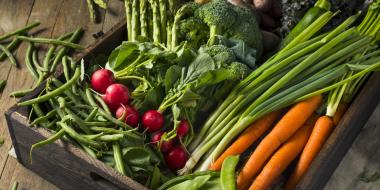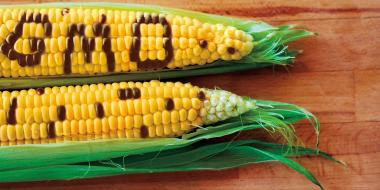Have you ever been disappointed with the quality of produce you find at your local grocery stores? With the rising costs of groceries, it’s more important than ever to make sure we’re getting the best value for our money. Thankfully, some communities offer options like community-shared agriculture (CSA) to help get the best for our families; they can be a great way to source quality fruits and vegetables.
CSAs typically work on a subscription model. After choosing a local farm, you sign up to receive seasonal produce at regular intervals, usually weekly. A share can consist of 8–10 types of freshly harvested fruits and vegetables. CSA’s are often organic and non-genetically modified, meaning you can feel at ease about receiving the best for your family. Depending on where you live, shares usually run during the growing season—from June to October—though some farms that use greenhouses offer shares year-round.
As a CSA shareholder, you’d pay for the season up front. This provides the farmer with the necessary funds at the beginning of each season to help grow quality produce for you.2 Since you can’t choose the produce that comes in each bundle, your farm may provide recipes to help you get creative. Once the share begins, you have a few options for getting your produce: You can pick it up directly from the farm or a fellow CSA shareholder's house, or you can have it delivered. This is a great way to support your local farmers and also feel good about where your food is coming from.
Beyond CSAs being organic, non-GMO, and fresh, let’s explore some additional benefits for you, the environment, and your community.
For You
-
Save money: CSA subscriptions often end up costing less than your average trip to the grocery store!
- Fresh food: At CSA farms, you can enjoy the benefit of ripe-picked produce, which is usually more palatable. Most grocery stores are supplied with produce that is subject to cold storage to slow down the ripening process to preserve freshness during travel.
- Your gut loves variety: The American Gut Project, the largest microbiome study to date, found that having 30 plus unique plant foods per week is ideal for gut microbiome biodiversity. This is important because a robust gut microbiome can be protective against many diseases such as cardiovascular disease, gut diseases, obesity, and nerve disorders like multiple sclerosis.
For the Community
-
Supporting the local economy: With the industrialization of the agricultural industry, many small farms have been shutting down because they cannot compete with corporations that mass produce their harvest. Small farms depend on local consumers for their livelihood.
- Community-building: CSAs help develop a sense of community, where you can develop a connection with farmers and their families. Some CSAs even offer gatherings where you have the opportunity to socialize with fellow members, meet the farmers, and see where your food is grown.
For the Environment
-
Local farming preserves biodiversity: Organic farming promotes the sustainable use of natural resources and helps preserve biodiversity and the environment. Local organic farming techniques involve fewer chemical pesticides and use crop rotation to ensure the soil remains healthy. Conventional farming techniques lead to poor soil health due to increases in salinity (salt content). Poor soil health fails to provide plants with the nutrients they need to thrive, thereby reducing the harvest yield. Unfortunately, conventional farmers compensate for this by using fertilizers and pesticides. The excessive use of these substances worsens soil health and introduces contaminants into the watershed—negatively impacting future agricultural use of that land. Conventional farming also reduces blue-green algae growth in nearby wetlands, further reducing biodiversity in the environment.
- Lower greenhouse gas emissions: Supporting a CSA eliminates the long-haul transportation needed for grocery store produce. This vast reduction in transportation lowers pollution and greenhouse gas emissions.
- Less waste: CSAs discourage the use of plastic packaging. Farmers encourage you to bring your own basket for pick-up, or they can deliver in reusable bins.
- Less energy use: CSA farmers do not need to refrigerate their produce in transit. Their produce is often harvested on the same day as pick-up.
BEFORE YOU LEAP
Before signing up for a CSA, here are some important things to consider:
- Potential food waste: One of the top reasons that CSA members may not renew their membership is because of food waste. Since CSAs usually offer 8–10 veggies and fruits per week, you must consider whether the amount is practical for your family.
- No Choice: In a CSA, you don’t have the option of choosing your produce, since the harvest depends on seasonal availability and yield. Due to the lack of choice, a CSA might not be ideal for your family.
- Homemade meals: CSAs provide fresh produce, which means prepping and cooking your own produce. A CSA might not be ideal for you if your schedule doesn’t allow for homemade meals.
If committing to a CSA subscription feels overwhelming, you might want to explore alternative options. You can share a CSA membership with a friend, opt for a bi-weekly share, or simply purchase produce occasionally at your nearby farmers’ market.
Pro Tip: Try canning or pickling your veggies for long-term storage!
I’M READY, SIGN ME UP!
There are so many benefits to community-shared agriculture. If you’d like to join a CSA in your community, Local Harvest is a great resource for finding CSA farmers near you.
Participating in a CSA can help preserve biodiversity, reduce your carbon footprint, support the local economy, and encourage you to try new recipes. You can feel good about supporting local farmers while getting fresh, organic produce straight from their farm to your table.








